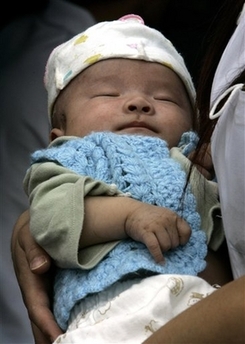Chinese eager to adopt quake orphans
(Agencies)
Updated: 2008-05-23 16:03
Updated: 2008-05-23 16:03
Mianyang - The children's faces stare in somber black-and-white photos from newspapers and scribbled posters at relief camps, seeking their parents. Many will never find them.
 An orphan baby, who survived on last week's earthquake in Beichuan, sleeps on a nurse's arm at a hospital in Mianyang, Sichuan province, China, Tuesday, May 20, 2008. [Agencies] |
As the first estimate of orphans -- more than 4,000 -- emerged Thursday from last week's deadly earthquake, thousands of Chinese are rushing to offer their homes.
"My husband and I would really like to adopt an earthquake orphan (0-3 years old)," Wang Liqin wrote on popular website Tianya.com in a forum that was already three pages long.
The high interest is another sign of China's tremendous post-quake outpouring of sympathy, buoyed by rising prosperity.
The new enthusiasm also means that Americans and other foreigners wanting to adopt may not have a chance. Officials estimate that the number of Chinese wanting to adopt the earthquake's orphans may outnumber the orphans themselves.
"Every day, my ministry receives hundreds of calls," Jiang Li, China's vice minister of Civil Affairs, told reporters this week. At the Civil Affairs department in Sichuan province, the heart of the disaster area, calls reached 2,000 a day, the Xinhua News Agency said.
Some Chinese, reached this week by phone, said they want to adopt because they're unable to have a child of their own. Some see a chance to have a second child despite the one-child policy. And some, like Wang, whose own baby didn't survive childbirth this year, understand loss and want to help.
"We saw how fragile life can be and have been wanting to adopt a child," Wang, who works in a clothing export business in the southern city of Guangzhou, said by telephone.
The true number of earthquake orphans will take a long time to know, with an estimated 5 million homeless and more than 29,000 missing in the mountainous region.
Officials are first hurrying to sort out actual orphans, trying to reunite children with relatives. Newspapers in Sichuan run the names and photos of children, asking the public for help. Dozens of similar pleas are posted at the sports arena in the city of Mianyang, now a relief camp for thousands of survivors.
Authorities are trying to protect the children from too much attention, moving into orphanages and university dorms, and refusing media requests to interview them.
"We've received many inquiries about adoptions, but at present it's simply too early since we're still in the rescue and recovery stage," said Wang Jun of the Chinese Foundation for Poverty Alleviation, a government-backed group that was put in charge of orphan issues in the city of Deyang just outside the earthquake zone.
|
||
|
||
|
|
|
|

